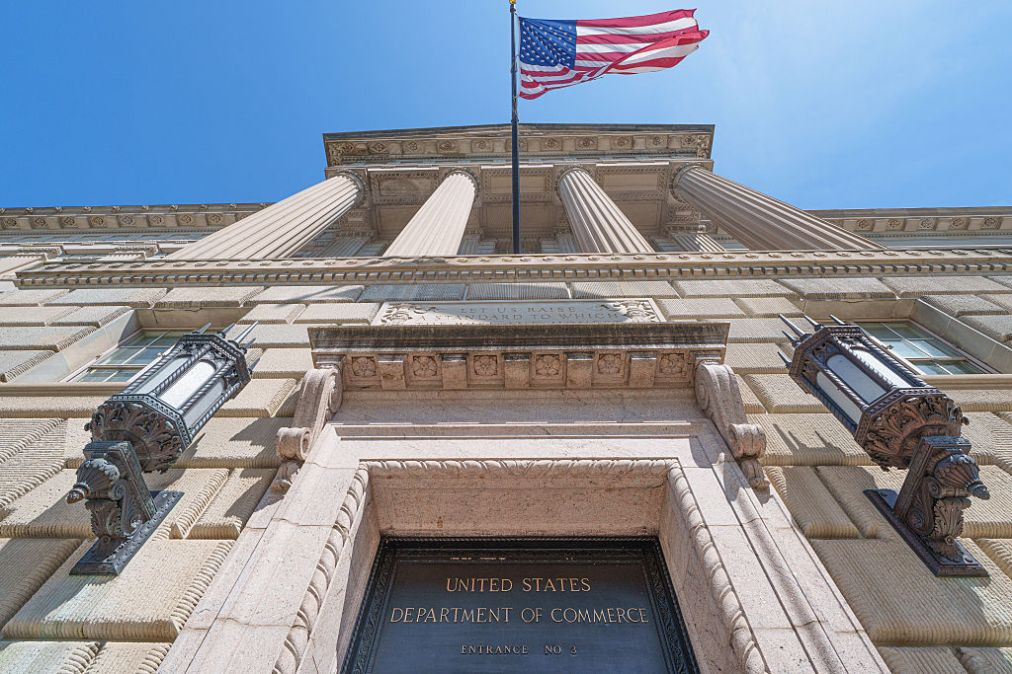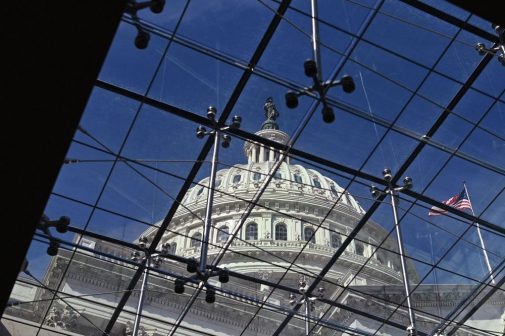Tech Hub supporters highlight silver lining in ‘disappointing’ decision to re-award millions

A recent Department of Commerce announcement that it would hold a new competition for roughly $210 million in regional Tech Hub awards made in the final days of the Biden administration frustrated program supporters and lawmakers, particularly those with awarded hubs in their states.
But for some, the recompete announcement also provided a small silver lining: The program designed to make investments in regional manufacturing, commercialization, and deployment of critical technologies will continue — at least for now.
Taking another year to make the awards will be time consuming and “disruptive for the places that thought they had an award in the bank,” said Mark Muro, a senior fellow at the Brookings Institution and director of its Metropolitan Policy Program.
However, he also noted: “This is also a moment where the administration does seem to be embracing a program, where there’s been uncertainty.”
Muro, who co-authored a 2019 paper credited as a catalyst for what eventually became the Tech Hubs program, said there’s still some questions around its future, including issues with the budget for the Economic Development Administration, the Commerce component that oversees it.
But it’s not “a wholesale erasure of this program,” he said.
Prior to the announcement, there had been some question as to what Commerce Secretary Howard Lutnick would do with the investment program created under the bipartisan CHIPS and Science Act. Despite that program’s bipartisan support, President Donald Trump has been somewhat critical of the 2022 law to boost domestic chip production and scientific innovation, the White House “skinny budget” zeroed out funding for EDA, and other federal grant programs have been subject to mass terminations.
Ultimately, Lutnick announced in a May 16 statement that there would be another competition for roughly $220 million, calling the previous administration’s process “rushed, opaque, and unfair.” Although Lutnick said the move wasn’t an “indictment of the work that the previously selected Tech Hubs are doing,” he said the department plans to release a new notice for funding opportunities this summer and aims to announce selections by early next year.
For the hubs and communities that thought they had implementation funding only to have it pulled away, the decision may seem “fundamentally unfair” and “disappointing,” said Bill Ruch, a tech lobbyist and principal who chairs the Technology Based Economic Development Practice at Lewis-Burke Associates LLC. Partners on several Tech Hubs are clients of Lewis-Burke.
Yet Ruch, like Muro, was hopeful about the continuation of the program.
The Tech Hubs weren’t intended to be a Biden administration program and were designed to grow no matter who won the election, Ruch said. “I think it is encouraging to see this administration picking that up and seeking to make their mark on it, so I am optimistic about that.”
In addition to the funds being re-awarded, Ruch said he’s looking forward to the millions in funding on the horizon for the program. With that, the Trump administration has “a fair shot at running this program” and putting their stamp on it, he said. “So whatever that looks like, we’ll see.”
Funding question
The funds in question came from the fiscal year 2025 National Defense Authorization Act, which appropriated up to $500 million for the Tech Hubs program divided into two parts.
The first portion was $220 million available via a loan through the Department of Treasury and the second was up to $280 million depending on the proceeds from a spectrum auction run by the Federal Communications Commission — in other words, the government’s method of selling rights to use radio frequencies.
Following the passage of the NDAA, the Biden administration moved quickly to award the first batch of loaned funds, opting to use existing applications for implementation funding. Those six awards to hubs in red and blue states were announced Jan. 14.
According to a fact sheet provided by Commerce after Lutnick’s announcement, the awards received criticism from Tech Hubs that didn’t get funding and the lawmakers who represent them in Congress. Lutnick also claimed in his statement that the funds “were not yet available” at the time of the Biden administration’s awards, and that the loan was approved and executed in March.
However, Cristina Killingsworth, former acting assistant secretary of commerce and economic development, told FedScoop in a statement that the decision to make the awards quickly was due to the urgent need of those funds.
“Given the critical importance of commercializing technology here in the United States to advance our national security, as well as our deep understanding of the Tech Hubs designees and their needs, we made a decision that we would move quickly on those funds, and I think that that was the right decision,” Killingsworth said.
Killingsworth added that the resources were going toward technologies and industries that were already vetted through the designation process, and that they knew there was a critical need to spend money on those areas immediately.
When asked about the decision, a spokesman for Sen. Todd Young — who championed the CHIPS and Science Act — pointed to the Indiana Republican’s advocacy for the additional Tech Hubs funding in the fiscal year 2025 NDAA. Young “is confident the Trump Administration will ensure those limited dollars are allocated to the best prospective applicants to fulfill the mission of the program,” he said.
Hill response
Lawmakers underscored the urgency and importance of the previously awarded hubs, in statements following the decision, albeit in different ways. While Democrats outright criticized the decision, Republicans who had hubs in their states offered statements of support for those projects that lost funding.
“This is causing us chaos and uncertainty in a race against world competitors to build high rate manufactured composites likely to determine which country wins the aerospace future,” said Sen. Maria Cantwell, a Democrat representing Washington state, which jointly shares one of the awarded Tech Hubs with Idaho.
A $48 million award to the American Aerospace Materials Manufacturing Center in Washington and Idaho, which focuses on military and commercial aerospace innovations, was among those impacted by the decision.
A spokesperson for Sen. Mike Crapo, R-Idaho, meanwhile, told FedScoop in an email that the lawmaker continues to support the aerospace-driven hub shared between the states “and is working with congressional colleagues to advocate for its continued funding in order to support Idaho.”
Sen. Jeff Merkley, D-Ore., said in an emailed statement that he was disappointed and that “starting the selection process from scratch delays development of America’s semiconductor manufacturing industry at a critical moment.”
Under the original awards, Oregon State University’s Corvallis Microfluidics Tech Hub, known as CorMic, was awarded $45 million for its work to advance microfluidics technologies “for use in semiconductor cooling, continuous flow processing, and biotechnology,” per its award page.
“CorMic has an incredible team with the right chip R&D at the right moment. I am confident that they will be selected again. I’ll do all in my power to support their success,” Merkley said.
In Alabama, Republican Sen. Katie Britt said in an emailed statement that she remains “strongly supportive of establishing a Biotech Hub in Birmingham and believe the Magic City’s proposal is well positioned to earn a grant from the Trump Administration.”
A $44 million award for “equitable AI-driven biotechnology” at the Birmingham Biotechnology Hub, which is led by the Southern Research Institute, was part of the six Biden administration awards.
Britt said the “initiative is more than just an investment in the state of Alabama — it is a strategic investment in our national security,” and pointed to the hub’s potential to advance the Trump administration’s goals on biomedical leadership amid growing threats from China.
Confirmation questions
While somewhat surprising, questions Lutnick received at his January confirmation hearing on Tech Hubs foreshadowed the decision and highlighted interest from some lawmakers to get a slice of the pie.
“What I think also may be playing into the current cross currents is that some states just wish they had gotten one,” Muro said of the hubs. Due to the program’s value and popularity, he added, “the Trump administration, I think, wants to put its brand on it.”
During Lutnick’s hearing before the Senate Committee on Commerce, Science, and Transportation, senators on both sides of the dais voiced interest in seeing the Tech Hubs continue, and asked the then-nominee to make varying commitments about how he would proceed.
Democrats, on one hand, were concerned about the fulfillment of current awards. Sen. Tammy Duckworth, for example, pointed to a Tech Hub in her state of Illinois focused on biomanufacturing and precision fermentation that was awarded $51 million, and asked Lutnick if he would “commit to disbursing all obligated grant funding from the Department of Commerce on time and without delay.”
In response, Lutnick said, “if you add rigorously and making it as efficient as possible, I can say yes.”
Republicans, on the other hand, urged Lutnick to expand funding to new regions. Sen. Roger Wicker of Mississippi told Lutnick there’s interest among lawmakers to grow the hubs in rural areas, and specifically asked him to take a closer look at the southeast region, which he said “did not do so well in the first application.”
Sen. Ted Cruz, R-Texas, who chairs the committee, specifically called out the Biden administration awards, alleging that the program was a “piggy bank for low-performing blue states” and that the awards made in the final days were an attempt to shovel “as much money out the door as they could.”
“Once again, Texas received zero — nada — even though it has a designated semiconductor hub and a booming tech industry,” he said. Cruz further asked Lutnick to commit to reviewing the Tech Hubs program and ensuring the process is competitive and merit based. Lutnick said he would.
This story was updated May 29 to correct the name of the Economic Development Administration.






